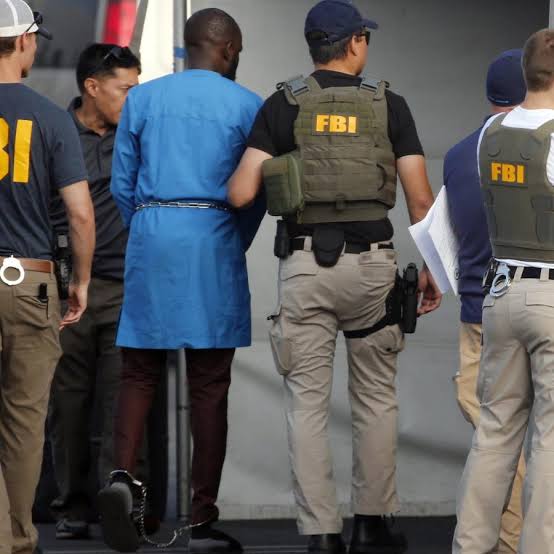
A 40-year-old Nigerian man was arrested in New York on charges that he, and others, conspired to fraudulently obtain at least $10 million in COVID-19 unemployment benefits.
Yomi Jones Olayeye, a/k/a “Sabbie,” of Lagos, Nigeria, was arrested on August 13, 2024, upon arriving at John F. Kennedy International Airport in New York City.
Acting United States Attorney Joshua S. Levy; Special Agent in Charge Andrew Murphy of the U.S. Secret Service Boston Field Office; Jonathan Mellone, Special Agent in Charge of the Department of Labor, Office of Inspector General; and Jodi Cohen, Special Agent in Charge of the Federal Bureau of Investigation, Boston Division made the announcement on Monday, August 19. Assistant U.S. Attorney Seth B. Kosto, Deputy Chief of the Securities, Financial & Cyber Fraud Unit is prosecuting the case.
Olayeye is charged with one count of wire fraud conspiracy, one count of wire fraud and one count of aggravated identity theft. He made an initial appearance in the Eastern District of New York on Aug. 14, 2024, and will appear in federal court in Boston on Tuesday, August 20.
According to the charging document, between March and July 2020, Olayeye and others defrauded three pandemic assistance programs administrated by the Massachusetts Department of Unemployment Assistance and other states’ unemployment insurance agencies: traditional unemployment insurance (UI), Pandemic Unemployment Assistance (PUA) and Federal Pandemic Unemployment Compensation (FPUC).
Specifically, Olayeye and his co-conspirators allegedly used personally identifiable information (PII) they purchased over criminal internet forums to apply for UI, PUA and FPUC – falsely representing themselves to be eligible state residents affected by the COVID-19 pandemic. Olayeye and his co-conspirators allegedly used the same fraudulently obtained PII to open U.S. bank and prepaid debit card accounts to receive assistance payments.
It is also alleged that Olayeye and his co-conspirators recruited U.S.-based account holders to receive and transfer the fraud proceeds via cash transfer applications. Olayeye and his co-conspirators then allegedly used the fraudulent proceeds to purchase Bitcoin via online marketplaces. It is further alleged that Olayeye and his co-conspirators concealed the conspiracy’s connection to Nigeria by leasing Internet Protocol addresses assigned to computers located in the United States for use in fraudulent transactions.
In total, Olayeye and his co-conspirators allegedly applied for at least $10 million in fraudulent UI, PUA and FPUC from Massachusetts, Hawaii, Indiana, Michigan, Pennsylvania, Montana, Maine, Ohio and Washington and received more than $1.5 million in assistance to which they were not entitled.
The charges of wire fraud and wire fraud conspiracy provide for a sentence of up to 20 years in prison, three years of supervised release, a fine of $250,000 or twice the gross gain or loss, forfeiture and restitution. The charge of aggravated identity theft calls for a mandatory minimum sentence of two years in prison to be added to any sentence imposed on the wire fraud charge. Sentences are imposed by a federal district court judge based upon the U.S. Sentencing Guidelines and statutes which govern the determination of a sentence in a criminal case.
On May 17, 2021, the Attorney General established the COVID-19 Fraud Enforcement Task Force to marshal the resources of the Department of Justice in partnership with agencies across the government to enhance efforts to combat and prevent pandemic-related fraud.
The Task Force bolsters efforts to investigate and prosecute the most culpable domestic and international criminal actors and assists agencies tasked with administering relief programs to prevent fraud by augmenting and incorporating existing coordination mechanisms, identifying resources and techniques to uncover fraudulent actors and their schemes, and sharing and harnessing information and insights gained from prior enforcement efforts.
The Senior Special Assistant to President Bola Tinubu on Community Engagement (North Central), Abiodun Essiet,…
The Minister of Information and National Orientation, Mohammed Idris, has warned politicians against linking stampedes…
Tobi Adegboyega, founder of the Salvation Proclaimers Anointed Church (SPAC Nation), has stated that he…
The Independent Petroleum Marketers Association of Nigeria has said that petrol is going to sell…
The former vice president made this disclosure in a statement on Sunday, reacting to the…
PRESS STATEMENT Nigerian Breweries PLC - The pioneer and largest brewing company in Nigeria which is…